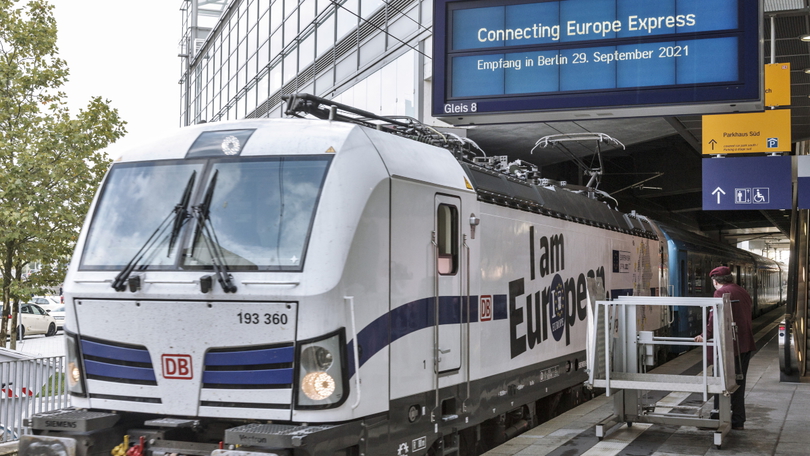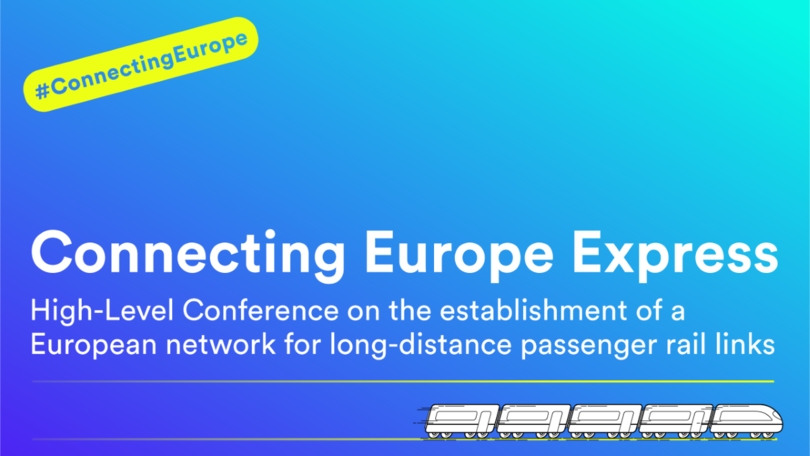
Source: BMDV
On 2 September, the Connecting Europe Express special train has started its journey across Europe in Lisbon. Until 7 October, it stopped in more than one hundred European cities, among them eleven German: Munich, Stuttgart, Ulm, Karlsruhe, Frankfurt am Main, Leipzig, Halle, Berlin, Hamburg, Bremen and Bad Bentheim. The Connecting Europe Express is a symbol of the importance of rail transport in bringing people and businesses together as well as of the important role of EU infrastructure policy and the Single European Railway Area. On-board the train, talks are planned with politicians and experts on various European transport issues. In the cities, flags were handed over and events were held at railway stations. Where longer stops were planned, a special wagon with an exhibition on new rail transport technologies and infrastructure projects in Europe could be visited. The special train, which is an initiative launched in the 2021 European Year of Rail, not only brings together the Portuguese, Slovenian and French EU Presidencies but also many European countries. On 7 October 2021, its journey, which started in Lisbon, ended in Paris. It consisted of wagons from railway undertakings from Italy, France, Hungary, Switzerland, Austria and Germany.
You can follow the video stream in English here:
In Berlin, EU Transport Commissioner Adina Vălean (represented by Dr Walter Götz, Head of Cabinet) took part in a conference on the establishment of a European network for long-distance passenger rail links with cross-border high-speed and overnight services. In Halle, EU Transport Commissioner Vălean (represented by Dr Walter Götz, Head of Cabinet) visited one of Europe’s most modern train formation facilities together with Dr Sigrid Nikutta, Member of the Management Board of Deutsche Bahn AG and Chairwoman for Freight Transport of DB Cargo AG, to discuss opportunities and challenges in European freight transport.
“This train is a symbol of the close ties between the countries, cities and citizens of Europe, but also of the joint work ahead of us before rail will become the preferred mode of transport”, said the Commissioner for Transport Adina Vălean (represented by Dr Walter Götz, Head of Cabinet). “I would like to thank all partners as well as the Federal Ministry of Transport for their excellent cooperation on this project. I would be delighted if the citizens would welcome the Connecting Europe Express when it stops at a railway station nearby.”
Stops in Germany:
| 26 September | Munich Central Station |
| 27 September | Munich Central Station, Ulm Central Station, Stuttgart Central Station |
| 28 September | Karlsruhe Central Station, Frankfurt am Main Central Station |
| 29 September | Frankfurt am Main Central Station, Leipzig Central Station, Halle Rail Freight Terminal, Berlin Südkreuz |
| 30 September | Berlin East Station, Berlin Central Station, Hamburg Central Station |
| 3 October | Hamburg Central Station, Bremen Central Station, Bad Bentheim |
Several conferences on EU infrastructure policy and the role of the Trans-European Transport Network (TEN-T) took place along the route, including in Lisbon, Bucharest, Brno, Berlin and Bettemburg.
The High-Level Conference on the occasion of the stop of the Connecting Europe Express special train took place at Technikmuseum Berlin on 30 September 2021 from 10:00 to 13:30 hrs under the title “Building a Network of European Long-Distance Rail Services”.
The first panel discussion focused on: “Removing Obstacles to Long-Distance Services”. It dealt with questions such as:
“What are the main obstacles to cross-border long-distance rail services?”, “What are the participants doing to overcome these obstacles?” and “What is expected from Europe in this respect?”.
The second panel discussion focused on “The Role of Rail in Sustainable Mobility”.
The issue of sustainability was to be examined in all its facets (environment, society, finances and economy).
In the third panel discussion, short presentations on “New Initiatives in Cross-Border Rail Transport” were held by stakeholders, who highlighted recent developments in cross-border long-distance rail services and the strategies taken to develop their respective business models against the backdrop of the Fourth Railway Package aimed at increasing competition.
All panel discussions were facilitated by Kristian Schmidt, Director for Land Transport (Directorate-General for Mobility and Transport).
